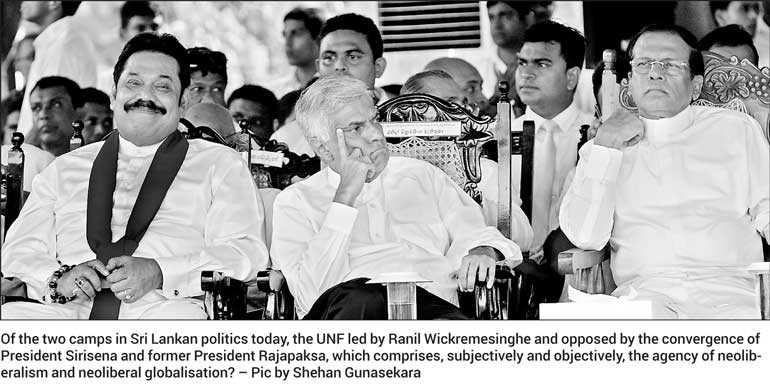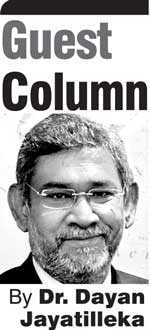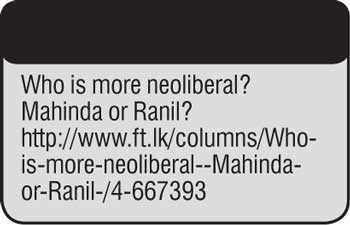Saturday Feb 21, 2026
Saturday Feb 21, 2026
Saturday, 24 November 2018 00:09 - - {{hitsCtrl.values.hits}}

A reply to Sarath De Alwis
 The main contradiction, and the main fight, in Sri Lanka today is between neoliberalism and the nation. Or more correctly between, on the one hand, the elite which is the agency of the project of neoliberal globalisation and its corollary, the ideology of neoliberal globalism, and the ‘people-nation’ (Gramsci) on the other. Those who accuse the Rajapaksas of ‘neoliberalism’ do not know what neoliberalism is and isn’t. They may be ‘red’ but are not well-read.
The main contradiction, and the main fight, in Sri Lanka today is between neoliberalism and the nation. Or more correctly between, on the one hand, the elite which is the agency of the project of neoliberal globalisation and its corollary, the ideology of neoliberal globalism, and the ‘people-nation’ (Gramsci) on the other. Those who accuse the Rajapaksas of ‘neoliberalism’ do not know what neoliberalism is and isn’t. They may be ‘red’ but are not well-read.
Neoliberalism is not the capitalist market economy. Neoliberalism is not mere privatisation – the crucial question being what is privatised and what is not. Neoliberalism is not the Open Economy. It is perfectly possible to practice an Open Economic policy which is not neoliberal. This is what Presidents Premadasa and Rajapaksa did.
Neoliberalism is not merely an economic policy. It cannot be understood as a checklist of economic policy measures such as privatisation.
Neo-liberalism is a new stage of imperialism. It can be understood not by economics alone but through Political Economy. That too has to be understood dialectically. Lenin was the most prominent to point out that at a different stage of its development and decomposition, global capitalism abandons its progressive slogans and projects of the past. It is such an abandonment, a negation, that has found form in neoliberalism.
At the heart of neoliberalism is not a list of economic polices but precisely the questions of the Nation and the State.
At an earlier stage of history, the bourgeoisie built up the nation state including in the periphery. However, after its victory in the Cold War, imperialism adopted a policy of dismantling the state and breaking up the nation, both in the economy as well as in the political domain (national sovereignty) so as to make for unfettered flow of capital and total integration into the world capitalist economy as vassal states.
This policy, which President Putin denounced as “state degradation” at the Energy Week conference which I attended, is at the heart of neoliberal globalism.
Today the resistance and opposition to neoliberal globalisation comes identifiably and generically from the Left only in a few cases, though important ones: Mexico’s Lopez Obrador and Britain’s Corbynist wing of the Labor Party. In general, however, the resistance to neoliberalism across the globe comes from Statism, Populism and Nationalism. These operate usually in some combination, to the point of overlapping and even amalgamating in many instances. The amalgam also takes divergent ideological forms—left, right and center, e.g. Mexico, Russia, USA/India.
The Rajapaksas are statists. They are also patriots or if you prefer, majoritarian nationalists. They are also populists. They stand or fall on these three legs of a tripod as it were.
These are the three reasons why they are not and by definition cannot be neoliberals or practitioners of neoliberalism. How can they retain their peasant support by permitting the abolition of land ceilings and the opening up of the land market to foreigners? How can they survive by allowing the scrapping of labor laws? How can they retain their support base by allowing the stripping of agrarian subsidies? How can they keep their popularity by allowing preferential tariffs which discriminate against local industry? How can they permit the rollback of all national boundaries and barriers which permit unfettered flow of capital and a swamping on the domestic entrepreneurs?
It is absurd to say the least to trace neoliberalism back to JR Jayewardene and forward to Mahinda Rajapaksa, because neoliberal globalisation or globalisation in its neoliberal stage arose only after the collapse of the socialist system and with the moment of unipolar hegemony. Until then imperialism needed the nation-state in countries outside of its home base, in order to counter the global challenge.
In Sri Lanka there have been only two leaders who have practiced neoliberalism. One was Chandrika Bandaranaike Kumaratunga, who foreignised the tea plantations whereas Premadasa, not being a neoliberal (he stood, in his words for a “carefully regulated market economy”), had only permitted local private sector firms to be granted five-year management contracts. The other, more conspicuous neoliberal was Prime Minister Ranil Wickremesinghe, by which I mean Wickremesinghe during his two stints as Prime Minister (ably supported in this regard by Mangala Samaraweera).
In the discussion on neoliberalism, it is unconscionably naïve to ignore the fact that Wickremesinghe deviated from the policy of the UNP and affiliated that party with the International Democratic Union, of which he became a Vice President. The IDU by its own description is the world body of parties of the Right, the Centre-Right and the Christian Democrats, and was co-founded by the US Republicans and UK Conservatives.
The Rajapaksas are no socialists but they do not have to be. Their economic model, just as that of President Sirisena and the SLFP, is state-led. As one of the world’s most outstanding Marxist minds (who passed away this year) Samir Amin, said in his last writings, the most successful and perhaps only viable alternative to the neoliberal model today is that of China—a model of sovereignist State capitalism. And the only alternative to neoliberal globalisation today is that of a multipolar globalisation centred on Eurasian interconnectedness as proposed and projected by China and Russia.
It is this thinking that led Lenin to write a century ago, of an “Advanced Asia and Backward Europe”. His view was that in Europe even the Labour parties had become enmeshed in imperialism but in Asia, even the rising bourgeoisie was opposed to imperialism. This thinking led Stalin in his typical manner to conclude that objectively speaking “The Emir of Afghanistan is more progressive than the British Labour Party”.
It is only an infantile left that assumes that neoliberalism can be defeated solely by a socialist alternative or by the Left allied with liberals or standing alone, in and of itself.
In his last published writing (‘Better Fewer, But Better’) in March 1923, Lenin was pronouncing on something far greater, more important and basic than ‘neoliberalism’ when he concluded that: “In the last analysis, the outcome of the struggle will be determined by the fact that Russia, India, China, etc., account for the overwhelming majority of the population of the globe…To ensure our existence until the next military conflict between the counter-revolutionary imperialist West and the revolutionary and nationalist East, between the most civilised countries of the world and the Orientally backward countries which, however, compromise the majority, this majority must become civilised…” (https://www.marxists.org/archive/lenin/works/1923/mar/02.htm)
From the viewpoint of political purity or ideological puritanism, one may shudder at the nativist, even homophobically inflected streak in the discourse of the Sirisena-Rajapaksa forces, but for any tough-minded anti-imperialist this is less than relevant:
“Among these there were masses imbued with the crudest prejudices, with the vaguest and most fantastic aims of struggle…But objectively, the mass movement was breaking the back of tsarism…Inevitably, sections of the petty bourgeoisie and of the backward workers will participate in it—without such participation, mass struggle is impossible…—and just as inevitably will they bring into the movement their prejudices, their reactionary fantasies, their weaknesses and errors. But objectively they will attack capital…” (https://www.marxists.org/archive/lenin/works/1916/jul/x01.htm)
As with ‘capital’ so too, and to a greater degree with neoliberalism and neoliberal globalisation. And as with Europe, so too and to a greater degree in the global South, especially Asia. What matters is objectively those who will attack it, whatever their subjective ideologies and discourses and however ‘politically incorrect’ they may be.
Fidel Castro for his part had the definitive word on neoliberalism. Margot Pepper whose book on Cuba was shortlisted for the 2006 American Book Award, quotes Fidel’s last speech at the Sao Paulo forum which he and Lula jointly founded after the USSR fell. Writing that “It [neoliberalism] is a policy Fidel warned against in the last speech I heard him pronounce live at this Forum”, she reproduces his authoritative conclusion as follows:
“Nobody can claim that objective or subjective conditions are favourable at this time for building socialism. I believe that at the present time there are other priorities… The most important  battle in Latin America today is, in my opinion, to defeat neoliberalism, because if we don’t—we will disappear as independent states and will become more of a colony than the “Third World” countries ever were.” (http://www.counterpunch.org/2016/11/29/was-fidel-a-dictator-a-personal-account/)
battle in Latin America today is, in my opinion, to defeat neoliberalism, because if we don’t—we will disappear as independent states and will become more of a colony than the “Third World” countries ever were.” (http://www.counterpunch.org/2016/11/29/was-fidel-a-dictator-a-personal-account/)
Of the two camps in Sri Lankan politics today, the UNF led by Ranil Wickremesinghe and opposed by the convergence of President Sirisena and former President Rajapaksa, which comprises, subjectively and objectively, the agency of neoliberalism and neoliberal globalisation? And which camp is objectively closer to that of the state-led Chinese model of a viable alternative to neoliberalism and neoliberal globalism, and the Russian-Chinese-Eurasian perspective of an alternative globalisation?
On whose watch, Ranil’s or President Sirisena’s and Rajapaksa’s (or President Sirisena’s or Rajapaksa’s), is Sri Lanka more likely to (in Fidel Castro’s words) “disappear as an independent state… and become more of a colony than the ‘Third World’ countries ever were”? On whose watch is Sri Lanka less likely to “disappear as an independent state…and become more of a colony than the ‘Third World’ countries ever were”? Because that, for Fidel was the “priority” and “the most important battle today”, as it should be for us. It most certainly is for me.